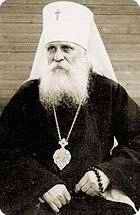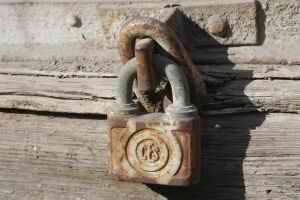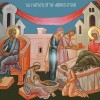 In 1913 I was in the Hermitage of Optina for the second time.
In 1913 I was in the Hermitage of Optina for the second time.
I lived in skete with hieromonk, a student of Kazan Ecclesiastical Academy , Fr. A.
Once, as we left for the Liturgy, we forgot to take the key, and the door slammed behind us; it locked automatically, and required a special screw key to be opened.
What we were to do? Taking out the window glass was no way out.
After the Liturgy, we told the oeconomus Fr. Macarius about our negligence.
He was a man of few words, even a bit strict. Someone gentle and obliging couldn’t have been chosen as the monastery’s oeconomus; he would squander the property.
Without a word, he took a bunch of keys and went to our dwelling. But the core of the same-looking key that he tried was narrower than the hole of the lock. So he picked up a little stick, snapped off a piece, put it along the key and started turning. But all his efforts were in vain, the key turned hopelessly without touching the safety slider.
”Father,” I told him, “You must have taken too thin a stick! Take a thicker one to make it tighter!”
He was silent for a moment, then answered.
“No, that’s not the problem… It is because I started without a prayer.”
He crossed himself religiously at once, pronouncing the Jesus Prayer:
“Lord Jesus Christ, Son of God, have mercy upon me the sinner.”
He began turning the key with the same stick, and the door unlocked immediately.
Later I witnessed it many times and ascertained by the others’ experience that calling the Lord’s name works miracles, even in the petty details of life. I haven’t only been taking advantage of it, but also sharing this with others everywhere I can.
Here is another example:
I was at a Christian youth congress in Germany , where our community had begun establishing a church.
A young man nicknamed Shu-Shu (Shura Shurovich, a shortening of Alexander Alexandrovich) was hanging icons on the wall.
It was a stone building. Nails pounded by Shu-Shu’s hammer would bend as they hit the stone wall. I saw his failure and said,
“Shu-Shu! You’d better cross yourself and say: ‘In the Name of the Father, and of the Son, and of the Holy Spirit’. And your task will go swiftly.”

He believed. Regained his humility. It’s not at all easy for a young one. He crossed himself, called God’s name, put a nail on another spot, and hit it with the hammer. It entered easily. After that, the whole job was done successfully.
Not long ago, I told this story to a group of acquaintances. In several days, a woman, widow K., who recently lost her husband, told me, ”After your story, I came home and went to sleep. And I’ve had insomnia for a long time. Nerves breaking down, apparently. And suddenly I remembered: You told us to call on God’s name, even in the smallest affairs. And I said to myself, ‘Lord! Give me sleep!’ I just don’t remember exactly, but it seems like I fell asleep at the same moment. Until that moment, I never managed to escape insomnia.”
TEMPTATION
And now I will tell you about how dangerous it is to live and even speak without the Lord’s name.
At the beginning of my monasticism, I was a private secretary for the Archbishop Sergius, who in that year was a member of the Synod and lived in Petrograd . Besides, I also was a hieromonk ministering commons in the town residence of the archbishop. Moreover, I was charged with the duty of preaching. Due to preaching I in some way began to seem ‘knowing,’ and sometimes simple souls addressed their questions to me.
Once when the divine service was over, a simple woman, a tall, rather plump blonde with a calm face and manners, approached me and said,
“Father! What shall I do? I’ve got some kind of temptation. Something appears before me every now and then. Usually something imaginary, untrue.”
“What is it like?” I asked.
“For example, I stand in church and suddenly a bucket of cucumbers falls from the ceiling near me. I rush to collect them, and yet there is nothing. As I turned awkwardly while rushing for those cucumbers, I hurt my leg, strained a tendon, perhaps. Now it aches.
“At home, I see cats running around the ceiling, head over heels. And so on.”
She told me all this very quietly, with no nervous exhaustion, excitement or with any other abnormal trait. Indeed, the woman from Tula was otherwise very healthy.
Her husband, tall, blonde and stout like her, with a calm smiling face, was a fireman at the Baltic Shipbuilding Factory. I got acquainted with him later, too. He also was very healthy. They lived in perfect harmony, peacefully, and got on together well.
It was obvious that there were some spiritual, supernatural occurrence. Inexperienced as I was, I could understand nothing and could do even less. I simply didn’t know what to say.
To keep up the conversation, I asked her when the visions started.
“In a way like that. I am sitting at my flat. And the firemen are provided with flats by the government, with heating and lighting. And the wage is good – enough for my husband and me. We have never had children – God didn’t give us, His holy will. I am sitting by the window with some work, saying to myself:
‘What a good life: I have everything I need, live in harmony with husband.’ God’s corner was in front of me, and after that John the Forerunner is coming out of the icon, true to life and telling me:
‘So, if you really are so happy, you ought to pay something for it, sacrifice something.’ I hardly recovered from fear, when he said again:
‘Here, slaughter yourself as a sacrifice.’
“And he disappeared. Father, I felt such fear, such torment of torments, that I went through hell. My heart ached so much I could hardly breath. Better it was to die. As if I were beside myself, I rushed to kitchen, seized a knife and was about to thrust it into my chest. Too much pain was there in heart. Seemed like death was a deliverance.
“Well, I don’t even know how it happened, but it was like someone knocked the knife out of my hands. It fell on the floor. And I came around. Since then, I began to see things. And I’m scared of that icon now.”
I listened and marveled. For the first time in my life, I heard such things from a real person, not read about in a hagiography.
“How can I help you?,” I asked. “I am no miracle-worker. Though come to the tonight service, confess, and receive the Communion tomorrow. After the mass, let’s go to your flat and conduct a prayer service with a blessing of waters. And then God’s will shall be revealed. When the icon frightens you, bring it to me.”
She listened humbly and quietly and went away. In the evening, she brought the icon of St. John the Precursor. I remember it now: about 8×5 inches sized, paper oleography, in a narrow brown frame.
After the divine service, the woman confessed to me. Such pure souls as hers are rarely seen in the secular world; she had no sins at all. Nevertheless, she repented some small things with attrition, although calmly as usual. Next day she communed, and we went to her flat.
I took everything I needed with me: a cross, the Gospel, aspergillum, as well as euchology, candles, a censer, and frankincense. Unfortunately, I forgot the epitrachelion, without which we are not allowed to conduct services. I remembered it halfway to the flat. What to do? I made up my mind that we didn’t need to return.
“Let’s go on. At home give me a fresh towel, I will bless it and use it instead of epitrachelion. Church rules allow us to do so in times of need. But after the service, never use it for any house work. Either donate it to Church, or better yet, hang it over an icon in the Holy corner. It will be a blessing for you.”
The flat was a normal room, clean, tidy and white. An icon with a lampion rested in the corner. The woman’s husband was at work.
We conducted the prayer service, sprinkling everything with holy water. She immediately hanged the towel over the icons, and served me some tea. I left shortly after.
Two or three days later, I saw her in the residence’s church and asked her how she was doing.
“Thank God!” she said. “It is over.”
“Yes, thank the Lord!” I answered, without even thinking that a miracle happened. Soon I completely forgot about it. Somehow, I didn’t even want to tell anyone what happened. I only revealed it to my spiritual father, to ask him why all this happened to that woman.
When he heard the story, he replied without hesitation.
“It occurred because she boasted,” my spiritual father explained. “One should never do it, especially aloud. Demons cannot stand it when a man feels good; they are spiteful and envious. But if a man keeps silent, according to St. Macarius of Egypt , the demons may guess a lot, yet don’t know everything. If a man boasts aloud, they will know and become annoyed, and then they try do him some harm. People’s bliss is unbearable to them.”
“But what shall one do if he is really feeling good?”
“In this case, it is still better to “guard oneself with silence,” as venerable Seraphim used to say. And if a man is willing to speak aloud or thank the Lord, he should guard it with God’s name: say ‘Thank God,’ or something. The woman boasted when she said ‘What a good life.’ She didn’t even call God’s name. Thus, demons found a way to her, with God’s dispensation.”
Venerable Macarius also said, “If you see something good, do not ascribe it to yourself, but refer to God and thank Him for it.”
This occurrence made many things in our language clearer to me. For example, in everyday communication, people of all countries and religions, especially Christians, use God’s name in the most proper way, even if they don’t realize it.
“God forbid! For God’s sake! God be with you! O Lord!”
“Good God! O my God!” etc. And the most common use for God’s name – at parting:
”With God’s help!”
Why is it this way? Because for centuries, people, by experience and collective observation, noticed the benefit of using God’s name, even without having strong faith or praying at the moment.
But the most remarkable is our Russian ‘simple’, and in fact wise man’s attitude to boasting. When he is asked, “How do you do?” he almost never swaggers, never says “good” or “wonderful.” He’d rather say reservedly something like that:
“Thank God, all right …”
And someone will say even more prudently, if everything is well:
“God’s merciful. And how are you?” Or:
“God is patient to sins.”
Or just plainly say:
“Thank God, not too bad.”
Everywhere there is caution, humility, and indispensable guarding with God’s name.
For example, a cart is stuck in a muddy hollow. A horse is struggling against the collar. Some madman may beat the poor beast and swear desperately. A sensible peasant will let it rest, cheer it up, and stroke it. Then he’ll prop up the cart with his own shoulder, wave a whip for show and shout,
“Hey, dear, come on! Godspeed!”
And, see, they are out of mud together.
I read a contemporary writer’s story about the power of God’s name. It took place during the German war. Cannons were moved to a new position.
Rain had fallen. The road was impassable. The load was incredible. There were a few pairs of horses. The cannon got stuck in a pothole. Soldiers were struggling, swearing, and whipping horses.
Only God knows what could come out of this unavailing torture of both men and horses. But after awhile, a fine-looking elderly man came upon the group and greeted the soldiers.
Then he wished them luck in the name of God, and stroked the horses. After the horses and soldiers had some rest, the old man suggested trying to move once more. He spoke to soldiers very gently. They rushed to cannon and horses. And the old man said:
“Come on, my dear, Godspeed!”
Soldiers shouted, horses jerked, and the cannon was pulled out of mud. After that, everything was easy.
There are so many examples! But, blind as we are, we pay no attention to them. Luckily, we speak with tongue, and this alone often saves us from the enemy’s power.
Meanwhile, in modern times, people have become ashamed of using this salvatory name.
Often, we can hear either a bitter complaint about a hard life or, quite the contrary, thoughtless boasts:
“Excellent, exxxcelent!”
Sometimes, we hear even mad words, such as “Good as hell,” or dark words. And feeling pity for the swearer you want to correct him.
Sometimes, when I heard praises, I either added it myself or asked the speaker,
“Say: ‘Thank God!’”
“What for?”
And I’d tell him such a story. And someone may take it into account.
From: Metropolian Veniamin (Fedchenkov). God’s Disposition in My Life. Moscow , 2001.
Translated by Ekaterina Baburina and edited by Paul Michna
















